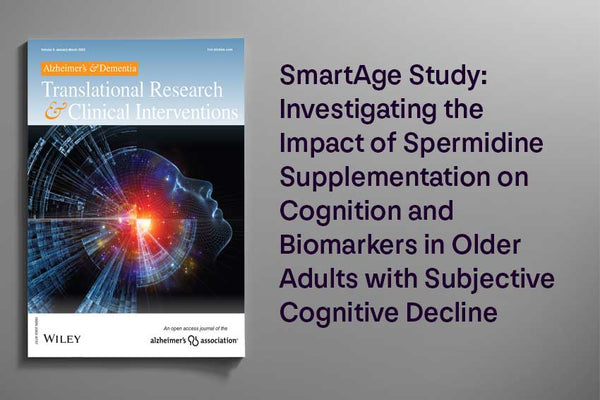
Published in 2019 in the Alzheimer's Research & Therapy journal, a study titled "Effects of spermidine supplementation on cognition and biomarkers in older adults with subjective cognitive decline (SmartAge)-study protocol for a randomized controlled trial" presents intriguing research about the use of spermidine in enhancing cognizance in older adults. This article explores the study and its potential ramification for anti-aging and longevity science. The complete study can be found here.
The global rise in age-related diseases and an aging population underlines the importance of promoting healthy aging. This study strives to provide constructive strategies for enhancing cognitive and brain health in the elderly affected by subjective cognitive decline (SCD). Notably, individuals with SCD are more likely to experience objective cognitive regression and progression to dementia dues to Alzheimer's disease. The researchers wanted to determine if supplementing with spermidine could positively affect memory performance compared to placebo in this high-risk group. They also aimed to investigate the effects of spermidine intake on other behavioral, neuropsychological, and physiological parameters.
This research, dubbed the SmartAge trial, adopts a double-blind, placebo-controlled, monocentric randomized phase IIb trial modality. Testing the effects of 12 months on a spermidine-based dietary supplement against a placebo in control, the study plan included recruiting 100 cognitively normal, older individuals with SCD. Primary outcomes considered the change in memory performance between baseline and post-intervention visits (12 months after baseline). In addition, secondary outcomes addressed the change in memory performance from baseline to follow-up assessment (18 months from baseline) and changes in neurocognitive, behavioral, and physiological parameters using blood and neuroimaging biomarkers assessed at baseline and post-intervention.
The findings of the SmartAge trial should provide significant insights into the impact of spermidine supplementation on memory performance in older individuals with SCD. Moreover, potential neurophysiological mechanisms underlying the expected cognitive benefits will likely be identified. Overall, the trial aims to contribute to the development of nutritional intervention in preventing Alzheimer's disease.
